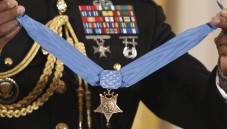
Sgt. Emmanuel P. Velayo is a scout sniper serving with Scout Sniper Platoon, 1st Battalion, 4th Marine Regiment. Velayo, a 24 year-old native of Anchorage, Alaska, said using the ghillie suit to blend in with terrain is like playing hide-and-seek. The suit is made from torn burlap material sewn into his camouflage utilities. Velayo has been a part of the scout sniper platoon for five years. Upon graduating the school of infantry, Velayo’s high physical fitness and marksmanship scores impressed previous snipers from the platoon who recommended him for the scout sniper course. (U.S. Marine Corps photo by Lance Cpl. Corey Dabney)
A six-man team of scout snipers hiked through snowy, mountainous terrain under heavy winds. With freezing temperatures and no warming layers packed, the Marines looked to Sgt. Emmanuel P. Velayo to get them through their mission during mountain scout sniper course at the Mountain Warfare Training Center in Bridgeport, Calif.
A native of Anchorage, Alaska, Velayo is accustomed to cold weather environments.
The team brought enough supplies to remain in the field for two days, but the commander extended the mission to six days.
| More: Marines endure cold-weather training in California |
On the final day, the Marines were down to two quarts of water and one meal. Velayo helped them overcome the cold by teaching his Marines to stay close to each other and use natural formations in their surroundings to block the wind.

Sgt. Emmanuel P. Velayo is a 24-year-old native of Anchorage, Alaska, serving as a scout sniper with Scout Sniper Platoon, 1st Battalion, 4th Marine Regiment. Velayo said he enjoys using his ghillie suit to blend in with his environment. (U.S. Marine Corps photo by Lance Cpl. Corey Dabney)
The habits Velayo garnered growing up prepared him for this grueling training scenario, and more so to succeed as an elite sniper within the Marine Corps.
Marine scout snipers are precision shooters whose mission is to hit long-range targets from concealed positions in support of combat operations. They conduct reconnaissance and surveillance operations in order to gain intelligence on the enemy and the terrain.
Velayo said growing up he had to be tough to compete with his cousins.
“Velayo was a tough kid,” said Christopher Gobaleza, Velayo’s 26-year-old cousin. “He was the runt of the family, so I guess he felt he always had something to prove.”
Whether it was sports, fishing or school, Velayo wanted to be able to compete with his older cousins, Gobaleza said.
“I remember we all went fishing for king salmon and decided to play king of the river, a game the family played to see who could catch the biggest fish,” said Gobaleza. “Those fish weigh about 50 pounds on average, and he had a really big one on the line. I remember him fighting to get it to the shoreline and nearly falling in. I reached for it, and he snapped at me yelling, ‘No! I can do it myself.’ He reeled it in himself. He was 9 years old back then.”
Today, as a scout sniper, Velayo said he has to endure sleep deprivation and high and low temperatures while moving and observing targets for days.
“I have hiked for 10 miles wearing 75 pounds of gear, but I couldn’t drop my pack,” said Velayo.
During his first attempt to become a scout sniper, Velayo didn’t complete the course. He refused to let the Marines who relied on him down and tried the course a second time. He passed as the best shooter.
“Since he was growing up, he never wanted to let anyone down,” Gobaleza said. “That’s something you can’t find in just anybody.”

Sgt. Emmanuel P. Velayo, a scout sniper serving with Scout Sniper Platoon, 1st Battalion, 4th Marine Regiment, fires his M40A5 series sniper rifle at a target 300 meters away during known-distance firing training in Bridgeport, Calif., Oct. 18, 2012.Velayo said living through both the warm and cold weather of his hometown climate in Alaska helped him complete Basic Scout Sniper Course. (U.S. Marine Corps photo by Lance Cpl. Corey Dabney)
Snipers don’t quit on their team, Velayo said. They have to have the mental toughness to complete their mission under mental and physical strains.
“Velayo was always very determined,” said his father, Dante Velayo. “If he put his mind to it, he was going to do it.”
His cousins were older than him, so Velayo had to exert more effort to compete with them, Dante said.
“Since he was in the second grade, Velayo played hockey with his friends and family,” Dante said. “He practiced hard because he always wanted to be number one. It didn’t matter if he was playing a sport or competing against other students in the classroom, he wanted to be the best.”
His competitive nature helped him as a scout sniper, Velayo said. The snipers have a motto, “It pays to be the victor.”
Scout snipers compete against one another to find out who’s the better shooter or who’s more physically fit, Velayo said.
“Competing against each other makes the platoon stronger,” Velayo said, “It increases the morale and gives you the opportunity to show everyone else what you’re good at. Whenever someone challenges you to anything, you want to beat them.”
Velayo said his competitive nature played a big role in graduating Basic Scout Sniper Course, but patience was also needed.

Sgt. Emmanuel P. Velayo, a scout sniper serving with Scout Sniper Platoon, 1st Battalion, 4th Marine Regiment, laughs as he competes against another Marine during known-distance firing training here, Oct. 18, 2012. Velayo, a 24-year-old native of Anchorage, Alaska, celebrated his birthday on the range engaging in friendly competition with his Marines. (Official United States Marine Corps photo by Lance Cpl. Corey Dabney)
When Velayo was 11 years old, his dad took him to the Montana Creek in Alaska to go fishing. As the time passed neither of the two had caught a fish, but they stayed because they refused to go home empty-handed. It was six hours before they caught their first fish.
Being out on the river while the water is slow is frustrating, Velayo said. Patience is the key to making the catch. It is also a big factor that plays into being a sniper.
Scout snipers must be patient enough to wait for days when watching a target, Velayo said. Sometimes, they’d only move a few feet every hour to avoid being detected.
“I remember being in Iraq watching a building for a few days with my team,” Velayo said. “It was very boring, and I just wanted something to happen. It took a lot of patience to just sit there and not do anything.”
Velayo said the Marines in his platoon are his extended family. He wants them to be able to compete with one another and build off of one another. From the traits Velayo learned growing up, he now teaches his Marines the toughness, competitiveness and patience needed to be the best Marine Corps scout snipers.
-
The Last China Band
May 18th, 2012 // By Sgt. Andrew Milner & Sgt. Priscilla SnedenFrom 1927 to 1941, members of the 4th Marine Regiment were stationed in Shanghai, China, protecting American citizens and their property in the Shanghai International Settlement during the Chinese Revolution and the second Sino-Japanese War. [Read more...]









